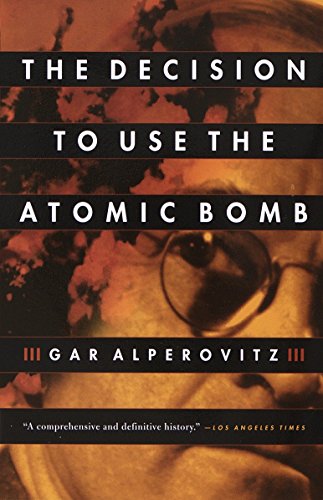August 6 usually doesn’t make headlines in America. But mark the day by what absence demonstrates: On the 72nd anniversary of the nuclear destruction of Hiroshima and some 140,000 non-combatants, there is no call for reflection in the United States.
In an era when pundits routinely worry about America’s loss of moral standing because of an offish, ill-mannered president, the only nation in history to employ a weapon of mass destruction on an epic scale, against an undefended civilian population, otherwise shrugs off the significance of an act of immorality.
But it is August 6, and so let us talk about Hiroshima.
Beyond the destruction lies the myth of the atomic bombings, the post-war creation of a mass memory of things that did not happen. This myth has become the underpinning of American war policy ever since, and carries forward the horrors of Hiroshima as generations of the August 6 anniversary pass.
 The Decision to Use th...
Best Price: $1.66
Buy New $9.45
(as of 03:10 UTC - Details)
The Decision to Use th...
Best Price: $1.66
Buy New $9.45
(as of 03:10 UTC - Details)
The myth, the one kneaded into public consciousness, is that the bombs were dropped out of grudging military necessity, to hasten the end of the war, to avoid a land invasion of Japan, maybe to give the Soviets a good pre-Cold War scare. Nasty work, but such is war. As a result, the attacks need not provoke anything akin to introspection or national reflection. The possibility, however remote, that the bombs were tools of revenge or malice, immoral acts, was defined away. They were merely necessary.
That is the evolved myth, but it was not the way the atomic bombings were first presented to the American people.
Harry Truman, in his 1945 announcement of the bomb, focused on vengeance, and on the new power to destroy at a button push—“We are now prepared to obliterate more rapidly and completely every productive enterprise the Japanese have above ground in any city,” said Mr. Truman. The plan put into play on August 6—to force the Japanese government to surrender by making it watch mass casualties of innocents—speaks to a scale of cruelty previously unseen. It was fair; they’d started it after all, and they deserved the pain.
The need to replace the justification to one of grudging military necessity, a tool for saving lives, grew out of John Hersey’s account of the human suffering in Hiroshima, first published in 1946 in the New Yorker. Owing to wartime censorship, Americans knew little of the ground truth of atomic war, and Hersey’s piece was shocking enough to the public that it required a formal response. Americans’ imagined belief that they’re a decent people needed to be reconciled with what had been done. With the Cold War getting underway, and with American leadership fully expecting to obliterate a few Russian cities in the near future, some nuclear philosophical groundwork needed to be laid.
 Pearl Harbor: The Seed...
Best Price: $16.97
Buy New $17.99
(as of 09:50 UTC - Details)
Pearl Harbor: The Seed...
Best Price: $16.97
Buy New $17.99
(as of 09:50 UTC - Details)
And so the idea that the bombing of Hiroshima was a “necessity” appeared in a 1947 article, signed by former Secretary of War Henry Stimson, though actually drafted by McGeorge Bundy (later an architect of the Vietnam War) and James Conant (a scientist who helped build the original bomb). Dr. Conant described the article’s purpose as countering Hersey’s account at the beginning of the Cold War as, “You have to get the past straight before you do much to prepare people for the future.”
The Stimson article was the moment of formal creation of the Hiroshima myth. A historically challengeable argument was recast as unquestionable—drop the bombs or kill off tens of thousands, or maybe it would be millions (the U.S. regularly revised casualty estimates upwards), of American boys in a land invasion of Japan. It became gospel that the Japanese would never have surrendered owing to their code of honor, though of course surrender is in fact exactly what happened. Nonetheless, such lies were created to buttress a national belief that no moral wrong was committed, and thus there was no need for reflection and introspection by the United States. Full speed ahead into the nuclear age.





